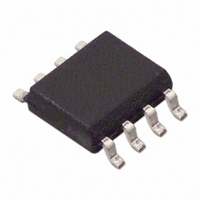OP292GSZ Analog Devices Inc, OP292GSZ Datasheet - Page 15

OP292GSZ
Manufacturer Part Number
OP292GSZ
Description
IC OPAMP GP 4MHZ DUAL 8SOIC
Manufacturer
Analog Devices Inc
Specifications of OP292GSZ
Slew Rate
4 V/µs
Amplifier Type
General Purpose
Number Of Circuits
2
Gain Bandwidth Product
4MHz
Current - Input Bias
375nA
Voltage - Input Offset
1000µV
Current - Supply
1mA
Current - Output / Channel
10.5mA
Voltage - Supply, Single/dual (±)
4.5 V ~ 33 V, ±2.25 V ~ 16.5 V
Operating Temperature
-40°C ~ 125°C
Mounting Type
Surface Mount
Package / Case
8-SOIC (3.9mm Width)
Op Amp Type
General Purpose
No. Of Amplifiers
2
Bandwidth
4MHz
Supply Voltage Range
4.5V To 33V
Amplifier Case Style
SOIC
No. Of Pins
8
Channel Separation
100
Common Mode Rejection Ratio
95
Current, Input Bias
450 nA
Current, Input Offset
7 nA
Current, Output
8 mA
Current, Supply
0.8 mA
Impedance, Thermal
43 °C/W
Number Of Amplifiers
Dual
Package Type
SOIC-8
Temperature, Operating, Range
-40 to +125 °C
Voltage, Gain
200 V/mV
Voltage, Input
4 V
Voltage, Noise
15 nV/sqrt Hz
Voltage, Offset
0.1 mV
Voltage, Output, High
4.1 V
Voltage, Output, Low
280 mV
Voltage, Supply
5 V
Lead Free Status / RoHS Status
Lead free / RoHS Compliant
Output Type
-
-3db Bandwidth
-
Lead Free Status / Rohs Status
RoHS Compliant part
Electrostatic Device
Available stocks
Company
Part Number
Manufacturer
Quantity
Price
Part Number:
OP292GSZ
Manufacturer:
ADI/亚德诺
Quantity:
20 000
Part Number:
OP292GSZ-REEL
Manufacturer:
ADI/亚德诺
Quantity:
20 000
50 Hz/60 Hz SINGLE-SUPPLY NOTCH FILTER
Figure 39 shows a notch filter that achieves nearly 30 dB of
60 Hz rejection while powered by only a single 12 V supply.
The circuit also works well on 5 V systems. The filter uses a
twin-T configuration, whose frequency selectivity depends
heavily on the relative matching of the capacitors and resistors in
the twin-T section. Mylar is a good choice for the capacitors of
the twin-T, and the relative matching of the capacitors and resistors
determines the pass-band symmetry of the filter. Using 1%
resistors and 5% capacitors produces satisfactory results.
The amount of rejection and the Q of the filter is solely determined
by one resistor and is shown in the table with Figure 39. The
bottom amplifier is used to split the supply to bias the amplifier
to midlevel. The circuit can be modified to reject 50 Hz by simply
changing the resistors in the twin-T section (Rl through R4)
from 2.67 kΩ to 3.16 kΩ and by changing R5 to ½ of 3.16 kΩ. For
best results, the common value resistors can be from a resistor
array for optimum matching characteristics.
FOUR-POLE BESSEL LOW-PASS FILTER
The linear phase filter in Figure 40 is designed to roll off at a
voice-band cutoff frequency of 3.6 kHz. The four poles are
formed by two cascading stages of 2-pole Sallen-Key filters.
NOTES
1. FOR 50Hz APPLICATION CHANGE R12 TO R4 TO 3.16kΩ
V
IN
AND R5 TO 1.58kΩ (3.16kΩ ÷ 2)
100kΩ
100kΩ
R6
100kΩ
FILTER Q
OP492
R8
R9
10.00
1/4
0.75
1.00
1.25
2.50
5.00
Figure 39. Single-Supply 50 Hz/60 Hz Notch Filter
12V
2.67kΩ
R1
R
+
Q
(1µF × 2)
1.0
2.0
3.0
8.0
C4
1µF
18
38
2.67kΩ
(kΩ )
R3
2µF
C3
OP492
REJECTION (dB)
C1
1µF
1/4
2.67kΩ
R2
40
35
30
25
20
15
R5
1.335kΩ
(2.67k ÷ 2)
2.67kΩ
C2
1µF
R4
6V
VOLTAGE GAIN
R7
1kΩ
1.33
1.50
1.60
1.80
1.90
1.95
OP492
1/4
12V
R
8kΩ
Q
V
OUT
Rev. C | Page 15 of 20
LOW COST, LINEARIZED THERMISTOR AMPLIFIER
An inexpensive thermometer amplifier circuit can be implemented
using low cost thermistors. One such implementation is shown
in Figure 41. The circuit measures temperature over the range
of 0°C to 70°C to an accuracy of ±0.3°C as the linearization
circuit works well within a narrow temperature range. However, it
can measure higher temperatures but at a slightly reduced accuracy.
To achieve the aforementioned accuracy, the nonlinearity of the
thermistor must be corrected. This is done by connecting the
thermistor in parallel with the 10 kΩ in the feedback loop of the
first stage amplifier. A constant operating current of 281 μA is
supplied by the resistor R1 with the 5 V reference from the
REF195
kept below 0.1°C.
In many cases, the thermistor is placed some distance from the
signal conditioning circuit. Under this condition, a 0.1 μF capacitor
placed across R2 will help to suppress noise pickup.
This linearization network creates an offset voltage that is corrected
by summing a compensating current with Potentiometer P1.
The temperature dependent signal is amplified by the second
stage, producing a transfer coefficient of −10 mV/°C at the output.
To calibrate, a precision decade box can be used in place of the
thermistor. For 0°C trim, the decade box is set to 32.650 kΩ,
and P1 is adjusted until the output of the circuit reads 0 V. To
trim the circuit at the full-scale temperature of 70°C, the decade
box is then set to 1.752 kΩ, and P2 is adjusted until the circuit
reads −0.70 V.
V
1
2
NOTES
1. ALL RESISTORS ARE 1%, 25ppm/°C EXCEPT R5 = 1%, 100ppm/°C.
IN
1.0µF
R
R1 = 0.1% IMPERIAL ASTRONICS M015.
T
Figure 40. Four-Pole Bessel Low-Pass Filter Using Sallen-Key Topology
100µF
= ALPHA THERMISTOR 13A1002-C3.
5V
such that the self-heating error of the thermistor is
1.78kΩ 16.2kΩ
5kΩ
5kΩ
REF195
Figure 41. Low Cost Linearized Thermistor Amplifier
15V
0°C TRIM
1µF
10kΩ
0.01µF
P1
5V
2
3
17.8kΩ
3300pF
R1
OP292
1/2
2
5V
8
4
10kΩ NTC
OP292
17.8kΩ
1/2
R1
1
R
41.2kΩ
806kΩ
T
2
1.1kΩ 14.3kΩ
1
R4
R5
10kΩ
0.022µF
R3
OP292/OP492
6
5
7.87kΩ
2200pF
OP292
R6
1/2
OP292
1/2
P2
200Ω
70°C TRIM
7
–10mV/°C
V
V
OUT
OUT













